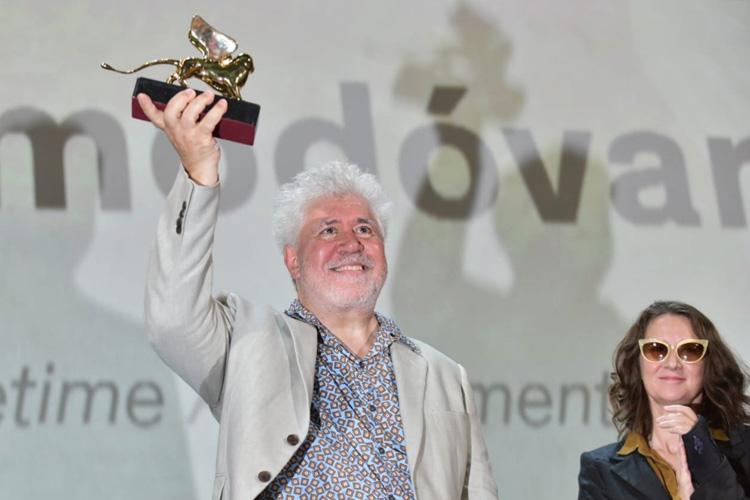
 Pedro Almodóvar received the Golden Lion for Lifetime
Achievement for directors at the 76th Venice International Film Festival
(August 28 – September 7, 2019).
Pedro Almodóvar received the Golden Lion for Lifetime
Achievement for directors at the 76th Venice International Film Festival
(August 28 – September 7, 2019).The decision was made by the board of the Biennale di Venezia, chaired by Paolo Baratta, which espoused the proposal made by the Director of the Festival, Alberto Barbera.
Accepting the award, Pedro Almodóvar declared:
“I am very excited and honoured with the gift of this Golden Lion. I have very
good memories of the Venice Film Festival. My international debut took place
there in 1983 with Dark Habits. It was the first time one of my
films travelled out of Spain, it was my international baptism and a wonderful
experience, as it was my return with Women on the Verge of a Nervous
Breakdown in 1988. This Lion is going to become my pet, along with the
two cats I live with. Thanks from the bottom of my heart for giving me this
award”.
Pedro Almodóvar will hold a masterclass on
Friday 30th August at 3:00 pm in the Sala Perla 2 (Palazzo del Casinò).
Access: public* (*please collect the free coupon at the ticket offices) - all pass holders.
Access: public* (*please collect the free coupon at the ticket offices) - all pass holders.
Regarding this award, Alberto Barbera declared,
“Almodóvar isn’t only the greatest and most influential Spanish
director since Buñuel, he is a filmmaker who has offered us the most
multifaceted, controversial, and provocative portraits of post-Franco Spain.
The topics of transgression, desire, and identity are the terrain of choice for
his films, which he imbues with corrosive humor and adorns with a visual
splendor that confers unusual radiance on the aesthetic camp and pop art to
which he explicitly refers. Lovesickness, the heartache of abandonment, the
contradictions of desire, and the lacerations of depression converge in movies
that straddle melodrama and its parody, achieving peaks of emotional
authenticity that redeem any potential formal excess. Without forgetting that
Almodóvar excels, above all, in painting incredibly original female portraits,
thanks to an exceptional empathy which allows him to represent their power,
emotional richness, and inevitable weaknesses with a rare and touching
authenticity.”
Pedro Almodóvar was born in Calzada de
Calatrava, in the heart of La Mancha, in the 50s. At seventeen, he left home
and moved to Madrid, with no money and no job, but with a very specific project
in mind: to study cinema and direct films. It was impossible to enrol in the
Official Film School because Franco had just closed it. Despite the
dictatorship that was suffocating the country, for an adolescent from the
provinces Madrid represented culture, independence and freedom.
He worked at many sporadic jobs, but he couldn’t buy his first
Super-8mm camera until he got a “serious” job at the National Telephone Company
of Spain in 1971. He worked there for twelve years as an administrative
assistant. In the mornings, his job gave him an in-depth knowledge of the
Spanish middle class at the start of the consumer era, with its dramas and its
misfortunes, a real gold mine for a future story teller. In the evenings and
nights, he wrote, loved, acted with the mythical independent theatre
group Los Goliardos and made films in Super-8. He collaborated
with various underground magazines and wrote stories, some of which were even
published. He was a member of a parody punk-rock group, Almodóvar &
McNamara. He had the good fortune that his personal explosion coincided
with the explosion of the democratic Madrid of the last seventies, early
eighties. That was the period the world knew as La Movida.
After a year and a half of eventful shooting on 16mm, in 1980 he
opened Pepi, Luci, Bom, a no-budget film made as a
cooperative effort with the rest of the crew and the cast, all beginners,
except for Carmen Maura.
In 1986, he founded the production company El Deseo with his
brother Agustín. Their first project was Law of Desire.
Since then, they have produced all the films that Pedro has written and
directed, they have also produced other young directors.
In 1988, Women on the Verge of a Nervous Breakdown brought
him international recognition. Since then, his films have opened all around the
world.
With All About my Mother (1999) he won
his first Academy Award for Best Foreign Film, he was also awarded as Best
Director in Cannes Film Festival. Three years later, Talk to Her got
him an Academy Award for Best Script.
In 2004, Bad Education was chosen to
open the Cannes Festival. In 2006, he presented Volver in
Cannes Film Festival, where it got the Best Screenplay Award as well as the
Best Actress Award for the six actresses of the film, leaded by Penélope Cruz,
who would eventually became the first Spanish actress nominated for an Academy
Award for a Spanish speaking film.
He is been awarded with the Prince of Asturias Award to the Arts
and has special University Honours by Harvard and Oxford Universities.
Some of his films have been adapted into plays (All About My Mother) and even into musicals (Women on the Verge of a Nervous Breakdown).
Some of his films have been adapted into plays (All About My Mother) and even into musicals (Women on the Verge of a Nervous Breakdown).
Filmography
1980 Pepi,
Luci, Bom
1982 Labyrinth of Passions
1983 Dark Habits
1984-85 What Have I Done to Deserve This?!
1985-86 Matador
1986 Law of Desire
1988 Women on the Verge of a Nervous Breakdown
1989 Tie Me Up! Tie Me Down!
1991 High Heels
1993 Kika
1995 The Flower of my Secret
1997 Live Flesh
1999 All About my Mother
2001 Talk to Her
2003 Bad Education
2006 Volver
2009 Broken Embraces
2011 The Skin I Live In
2013 I’m So Excited!
2016 Julieta
2019 Dolor y gloria
1982 Labyrinth of Passions
1983 Dark Habits
1984-85 What Have I Done to Deserve This?!
1985-86 Matador
1986 Law of Desire
1988 Women on the Verge of a Nervous Breakdown
1989 Tie Me Up! Tie Me Down!
1991 High Heels
1993 Kika
1995 The Flower of my Secret
1997 Live Flesh
1999 All About my Mother
2001 Talk to Her
2003 Bad Education
2006 Volver
2009 Broken Embraces
2011 The Skin I Live In
2013 I’m So Excited!
2016 Julieta
2019 Dolor y gloria
courtesy: LA BIENNALE DI VENEZIA
No comments:
Post a Comment